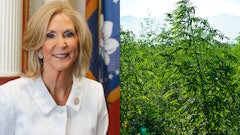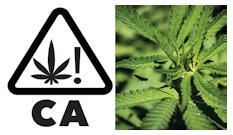
Though hemp is currently in the agricultural spotlight, it is likely to remain a specialty crop in the long-term, and a select few states will dominate the market for it.
That’s according to a recently released report from the U.S. Department of Agriculture (USDA) on the economic viability of industrial hemp in the U.S. based on a review of state pilot programs.
The 83-page document examines the success of states growing hemp under the Agricultural Act of 2014 (the 2014 Farm Bill) and what outside factors will determine the industry’s outcome.
According to the USDA’s report, long-term economic viability of the hemp industry will be affected by:
competition from other domestic crops, including marijuana in states where it is legal, for acreage
global competitors in hemp and hemp products
market information and transparency
the shifting regulatory environment
State Findings
Based on the USDA’s findings, the department estimates hemp won’t become a commodity like corn or soy. Instead, the USDA compares hemp to specialty crops that are only produced in a certain region of the U.S., like sesame, which is grown predominantly in Texas and Oklahoma.
“As with other crops, it is not likely that hemp will be economically viable in every state. Even if barriers to entry are low, growers are not likely to plant or process hemp if more profitable options exist,” the USDA says in its report.
The report adds that currently, the most successful operations for specialty crops, including hemp, are clustered around areas of related infrastructure that minimize transportation costs throughout the production process.
“Specialty and minor crops are often agronomically suited to a limited geographic area or economically viable in only a few states,” the USDA says in its report. “Typically, regional production has centered around a limited number of processing plants or contracting companies. Many specialty or minor crops have no cash or ‘spot’ market and are only grown by growers who have contracts (formal or informal) with processing companies.”
Notably, the USDA found the states that have been the most successful with hemp so far are those that have a long history with the crop. According to the report’s findings, the states that saw the most success under their pilot programs were those that “had proven agronomically suited to hemp in the past,” like Kentucky, which grew more hemp than any other state in the early 1900s.
It also found that the states that quickly established hemp pilot programs were not leading producers of competing major field crops like wheat, corn or soybeans. And Corn Belt States that were major hemp producers prior to its prohibition, like Illinois and Minnesota, had smaller pilot programs than those without predominant crops.
Hemp isn’t just competing with commodity crops, either. The report also found hemp is competing for investment with legal marijuana in some states, presenting another challenge for the crop to overcome.
In addition to agronomic considerations, state hemp programs also have variability in costs for hemp producers, which gives producers in some states and regions an advantage over others, the report says.
“If some states can achieve economies of scale with regards to growing, processing, and testing, that will make it more difficult for producers in other areas to profitably enter the market,” the report says.
Other Barriers to Entry
As of now, the hemp industry is still in flux and its future unknown due to a number of factors, one of which includes the crop’s various end uses.
The USDA says hemp product markets are at different stages of development. While cannabidiol (CBD) oil extract has garnered the most attention from potential producers and investors, its regulatory status is still evolving, making its long-term viability unknown.
Supply and demand for hemp is still shifting, too, and the USDA’s report was inconclusive on where and when it might land. Even though CBD is still in high demand, its supply is flooded in the marketplace, and the demand for hemp grown for fiber or grain may surpass it in the long run.
“As a joint product with oil production, changes in domestic and international fiber output will be influenced by the growing demand for CBD oil. Some producers may have planned to grow hemp for CBD oil or other extracts and also profit from selling the residual fiber, much as cotton producers sell both the cotton lint and the cotton seed,” the USDA says in its report. “But negative returns to fiber could offset profits from oil, and there were few examples of dual use reported as markets developed during the pilot programs.”
If hemp does remain in high demand for any end use, though, U.S. farmers still won’t be in the clear, as other countries present significant competition to the domestic market, the USDA says.
“If hemp for CBD or other purposes proves to be a profitable crop, competition from abroad will likely increase,” the USDA says. “Canada and Europe both have established infrastructure, management expertise, and markets. China has access to lower wage employees, unknown capacity, and the potential for more lenient regulatory standards in the future.”
Shifting regulations, both on the local and federal level, also present a layer of challenges to hemp’s withstanding viability. And a lack of standards regarding hemp production have also posed significant barriers to the industry’s growth.
In addition, the report calls the absence of pricing transparency a “serious impediment” to the industry.
“The history of specialty crops in the United States generally shows that they remain specialty crops. It is difficult to imagine, for example, the demand for acres for industrial hemp matching the demand for acres to grow corn or soybeans for animal or human food. On the other hand, the recent rapid growth of the alternative plant protein food sector does show some possibility for a ‘specialty’ crop to suddenly become a growing market sector,” the USDA concludes. “The next few years should see a resolution of the legal and regulatory issues constraining hemp production in the United States, leaving domestic production, imports, consumer demand, and exports to dictate growth and long-term market size.”
Read the full report on the USDA’s website.























